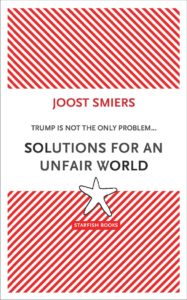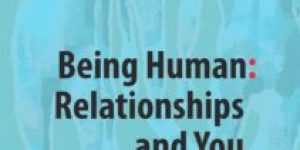Solutions For An Unfair World ~ Contents & Introduction: Consternation
No Comments yetContents
Consternation
1. The world in which we live is too complex
2. We have to bring trade under democratic control
3. Curb globalisation: a dialogue between the veritable left and the simplifying right
4. Peace in our time?
5. A president with messy moral standards
Bitter tears, bon courage
About the author & Acknowledgement & Literature
Consternation
After November 8, 2016, I have occasionally thought that the governments of civilised nations should recall their ambassadors from the United States, for consultation as it is called; I’d rather say for consideration. Thus far that recall did of course not happen, but consideration is more than ever necessary. After one year it is abundantly clear that Donald Trump’s government has not left relations within the us and the rest of the world untouched.
Obviously, us citizens must set their own course, but as residents of all corners of the world we have to consider what this Trump is doing. Let me mention in this essay a few points that we have to think about. What can we still expect, what have we already seen, how did that affect us, and how can we respond appropriately?
A warning is called for, and it comes from Luigi Zingales – as his name suggests an Italian, who is a professor in the United States. Make the comparison with Berlusconi, he suggests, and deduce lessons from that. ‘Mr. Berlusconi was able to govern Italy for as long as he did mostly thanks to the incompetence of his opposition. It was so rabidly obsessed with his personality that any substantive political debate disappeared; it focused only on personal attacks, the effect of which was to increase Mr. Berlusconi’s popularity.’ (New York Times, 22.11.16)
The purpose of this essay is not to fall into that trap. The election of Trump forces us, more than anything else, to consider some fundamental issues. At the same time we should not be afraid to formulate ambitious solutions. It is still possible to build a civilised, human, just and ecologically sustainable world. We need radical proposals for that, which I would like to present here in five – in principle separately readable – chapters.
I do not start with Trump – no matter how much we are talking about him. I want to focus first on four topics which form the core of the unrest that is raging around the world.
They contain a lot of explosive material. That is – I discuss it in the first chapter – the unmistakable fact that the unrestrained economic and cultural globalisation of the last decades has yielded relatively few winners, but an enormous amount of losers. If we see ‘simplifying right-wing currents’ playing into this, the question arises why the left, with some exceptions, has joined so easily in the neoliberal discourse about the blessings of global free trade, deregulation, privatisation and the degradation of the individual and collective protection of citizen rights, which had been established over the decades.
What is happening now is that the current, unrestrained economic globalisation is meeting with more and more resistance. But it’s not clear how we can get rid of it. The big question for now is which economic conditions we find just, human and efficient. This means that we need to make radical choices. This is what I am dealing with in the second chapter. Global, regional and bilateral trade treaties must be recalibrated. At the moment the purpose of these treaties is to give corporations and financial institutions the greatest possible freedom of action. But what about protecting the environment, pursuing social justice, enforcing decent working conditions, and finally ending tax evasion and tax fraud?
When rewriting and renegotiating trade agreements between countries, within regions and at a global level, these types of values must have priority. But that is not enough: too big and too powerful, and therefore democratically uncontrollable mega-corporations must be substantially reduced in size, and the intellectual property rights system that gives them so much power and privatises our jointly-built knowledge and creativity must be torn down. The reason for these major changes is also addressed in this second chapter.
This will be followed by a short, groundbreaking third chapter, with a somewhat unexpected proposal. One can find the forces that want to curb globalisation on the veritable left of the political spectrum and in the camp of what I call the simplifying right. For many people this will come as a small shock, but I think it is necessary that representatives of both extremes will start a dialogue with each other, in spite of all the outright differences and animosities between them. What connects them is however more important than what divides them. What connects them is the joint wish that the unrestrained and uncontrollable social, ideological and cultural globalisation will be stopped.
The fourth issue we are emphatically required to consider is something horrible: the threat of war. Weren’t we supposed to have peace after the Cold War? Forget it. The arms race is in full swing. After 1989, we thought nato would be an unnecessary organisation, but it gradually became an instrument that has advanced to the borders of Russia. Was that a prudent thing to do? Now that Trump has announced that he does not want to pay any longer for the defence of Western Europe, and that he intends to spend a lot more on armaments for the us, we have to think suddenly about what kind of army we want to have. The choice we have to make is clear: Europe will invest heavily in – above all – new and technologically ingenious weapons, or we will have to pay more attention to the organisation of disarmament conferences and weapon reductions. For the sake of clarity, I do not want to suggest that an army in itself is an unnecessary luxury; however, the question is what kind of army that should be. In addition, we must fear that the motto of years ago (‘All nuclear weapons should be removed from the face of the earth’) will be more to the point than ever. War and peace, that is the theme of the urgent fourth chapter.
After these major issues, I focus on Trump in the fifth chapter. What does he harbour for the world and how should we respond? It is problematic that the us have always pretended to be a luminous example of what a real democracy is. But then, the emperor is naked. We are even wondering if the presidential elections of 2016 were fraught with fraud. The trumpeting about of lies and half truths is the order of the day. The press, the judicial apparatus, the intelligence services and officials of various government departments are depicted as enemies of the people. Shame on them!!!!! As a result, the foundations needed for the good and fair functioning of the state are dismantled, which also seems to have been the intention of Trump’s former chief advisor Steve Bannon. Trump is further advancing this with his December 2017 tax law, which will lead to the evaporation of the institutions and social provisions of the state. Even for those who had not seen, before the election, that Trump is a man with totalitarian tendencies, it cannot be a mystery anymore: he really is, and more than that.
The most disturbing fact is that we have to fear that this hateful and warlike president is heading towards some form of coup. It is sometimes suggested that the institutions in the us are strong enough to ensure this will not happen. But unfortunately it cán happen if the people turn against those institutions. Moreover, the institutions are only as strong as the persons which carry them. In that regard the repulsive and opportunist behaviour of many Republicans does not seem to be hopeful. All this promises little good for the rest of the world. That’s why I conclude this chapter with the comment that it is a bit depressed – I can not make it any nicer.
The presidency of Donald Trump can be regarded as a catalyst which has accelerated what was already happening in the world. This essay is an attempt to find our way in all of this, and to think about how we can formulate an answer. It would not do the world any good if that answer would only come from the simplifying right. Of course, given the limited framework of an essay, pressing subjects will be left undiscussed. We can think of what Trump is doing in the Middle East (and in this case not as an entrepreneur). Will the nuclear agreement with Iran remain intact? Do the Palestinians really get the worst of it? Will the relationship between the us and China be one of peace, or will both powers steer a collision course, with the Philippines suddenly turning up in the economic and military ‘game’ as a joker? Will North Korea be bombed flat? Have the relations with Mexico lost their apparent innocence, can we rest assured that the Trump government will understand what developments occur in Latin America and in Africa, and will it deal with them prudently? And will the normalization of us-Cuba relations be undone? What makes the situation dangerous, is that Donald Trump improvises as far as foreign policy is concerned.
The biggest risk is that ultra-right forces in the US will do everything in their power to make the United Nations power less. According to Paul Kennedy, in his The Parliament of Men, we should be happy to have, in the form of the UN, something that we could not even have dreamt of before the Second World War. ‘We have established a town meeting place of the world.’ (2006: 286) That is something very special and we have to cherish it. Despite all its imperfections, with the United Nations we have created a central place where governments from all countries, large and small, can meet and implement international mechanisms.
Within the United Nations we have a multitude of international organisations for many issues in areas such as food, health, culture and education, human rights, and so on. Paul Kennedy: The least you can say, and that’s already really extraordinary, is that ‘the Great Powers remain inside the tent. At best, they can do great things.’(2006: 286) Probably I’m not the only one who fears that the Trump-government will not grant the UN the importance that the world needs.
All in all, I suppose that we are confronted by four major challenges. First of all, it is of the utmost urgency that, as I said before, the simplifying right and the veritable left will talk to each other, despite all mutual denunciations of the past. Why this bold proposal? The choice we are facing is the following: either we continue on the path of unrestrained and uncontrolled economic, social and cultural globalisation, or we have to understand that we, as citizens, are losing our grip on our living conditions through this ever-changing globalisation, and that something needs to be done.
The latter is one of the important messages that the simplifying right is taking out on the road. Precisely about that excessive globalisation a conversation is possible with the veritable left. Why do I prefer to talk about the simplifying right and not about the extreme right or the populist right? Whoever argues that the world in which we live has become too complex is not an extremist and not a populist either. But he or she might be simplifying, because simply calling for protectionism, the closing of borders and the setting off of trade wars, or considering people who are ‘different’ as the enemy, is not the solution. That shows naivety about the nature of the problems. The contribution to this conversation from the veritable left may be that the economic and financial power of large and powerful companies and financial institutions must be addressed.
Here is a challenging research task for the legal, economic, social, technical and agricultural institutes of universities: how can the transition be made from a global economy that is fullblown neoliberal to human-sized economies, in which companies are embedded in the societies in which they operate?
That is the first, and at the same time fascinating, challenge for the coming years. The second is of a completely different caliber. Whether we like it or not, Europe must engage with Russia, and rather today than tomorrow. The reality is that the current tensions between both parts of the European continent are not only due to Russia – in chapter 4 I will return to that. The choice is either to put even more armaments into play, to take NATO even closer to Russia and to stumble into a war, or to make diplomatic traffic work and to prepare the climate for disarmament conferences. In that respect we do not need NATO, on the contrary.
The third challenge that we need to confront is forced upon us by the rapidly changing political climate in the United States. The US have not yet become a totalitarian state, but human rights and the fundamental principles of the rule of law – and of civilisation – are under severe pressure, and it does not seem that this will suddenly improve, despite the resistance of many parts of the population. Slowly I get the strange feeling that Europe is surrounded by countries – now possibly also the US – that do not have many scruples about human rights and the active respect for the rule of law. That realisation charges us with the responsibility to signal every day all the tendencies that threaten to undermine and oppose the rule of law and human rights here in Europe as well. It turns out that a well-organised society is not an inviolable possession.
The fourth challenge also refers to the United States. Since the inauguration of Donald Trump as president the Atlantic alliance is being tested more and more day after day, by his style of governance as well as by the content of his policy in areas such as the environment, trade, financial traffic, armaments, nuclear weapons and NATO. Whatever one thinks about this policy, Europe must assume that the self-evidence that used to exist in the relationship with the United States since the Second World War has disappeared as snow before the sun. In itself, that could be good, but we can also get it wrong. This means that Europe is forced to redefine its relations with the United States in many areas. That will not be easy, if only because Europe is not a textbook example of unity when it comes to turning into new roads. Still, it will have to.
To make this terrifying concrete: Suppose it is not only so that Trump cs. have been in touch with certain circles in and around the Kremlin. The need to research this is urgent and it is not unthinkable that this leads to the impeachment of the 45th president of the US. Suppose as well that the elections as such have been sabotaged to the detriment of Hillary Clinton – the New York Times has used such words (22.3.17). Then it might be concluded that the presidential elections of 8 November 2016 have been hijacked, and that the legitimacy of the presidency of Donald Trump is at stake, as well as that of his potential successor. In the New York Times of March 24, 2017, Nicholas Kristof speaks of ‘A smell or treason in the air.’ High treason. If that is the case, there should be new presidential elections in the US. In Chapter 5 I will return to that. What will this bring about? We have to fear the worst. I’m not saying this will necessarily happen, but it is not an unthinkable scenario, and we should be prepared for that.
In this essay I will be frugal with citations and the names of authors, but of course I am in debt to many commentators who have helped me, both before and after November 8, 2016, to distinguish between essentials and side issues. At the end of my essay there is a list of my sources of inspiration, and there I thank my friends who have helped me to stay on track.
There are nearly two hundred countries in the world. Most of them have periodic elections, or something that looks like that. The results of these – as far as I follow them – can make me happy or sad, but even in countries that enjoy my special attention the elections have never put my life on its head. However, that has been the case with the arrival of Trump.
I reached maturity in a time of mutual trust and great expectations – expectations about equality, respect for others, concern for the climate – without being afflicted with the idea that a particular country or people is better than any other. Is this perspective disappearing?
My friends and I, and all the people that have suffered a similar shock as a result of Trump’s election, must find our way in a hard and dangerous world that we are not familiar with, but our values have remained unchanged. Hence this essay: an attempt to make the most of it.
You May Also Like
Comments
Leave a Reply








